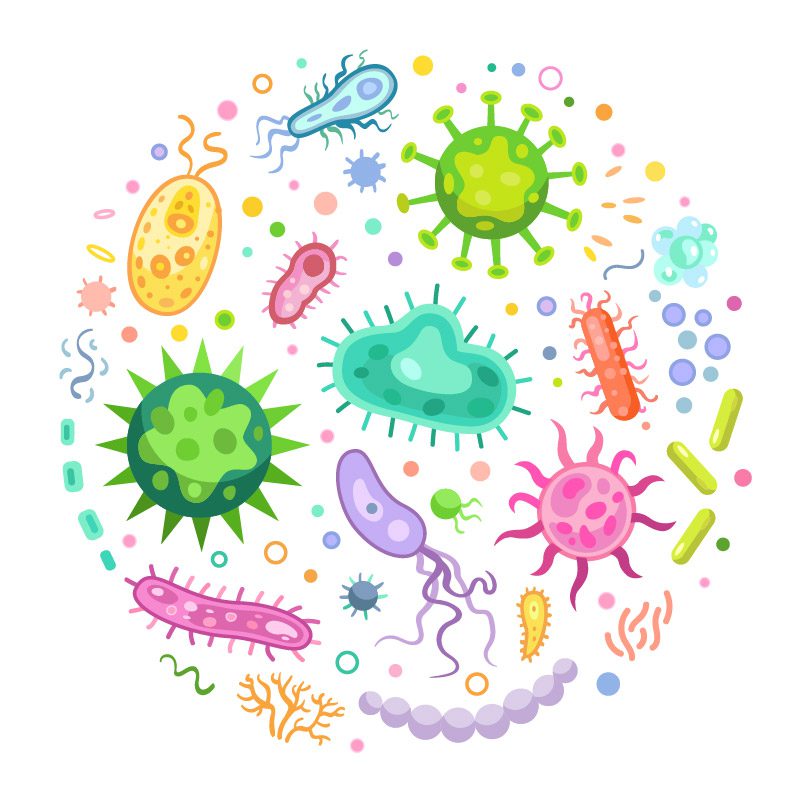Your gut bacteria directly impact your health in many ways, from helping build your immune system and influencing your weight and risk of certain diseases, like diabetes, obesity, and autoimmune, heart, and colon diseases, to affecting your brain, and in turn, your mental health and behavior. Gut health plays a significant role in mental health, and science shows there’s a clear link between your diet and your mental health.
You Have a “Second Brain” in Your Gut
In addition to the brain in your head, you also have a brain in your gut, called the enteric nervous system. This second brain consists of a network of some 500 million nerve cells and 100 million neurons lining your gut, esophagus to anus. Just like the brain in your head, the brain below uses over 30 neurotransmitters, including dopamine and serotonin. In fact, the bowels produce 95 percent of the body’s serotonin.
The gut microbiome is a vast community of trillions of microorganisms, consisting of bacteria, fungi, viruses, and other microscopic organisms that play a crucial role in maintaining your overall health. As well as allowing nutrients to enter the body and keeping opportunistic pathogens out, their activities also influence your brain and mental health.If you want more of an explanation of what the microbiome is and how your unique one is formed, read “How Gut Microbes Keep Your Brain Young.”
How Your Gut and Brain Communicate
The enteric nervous system isn’t capable of thought as we know it, but it does communicate directly with the brain in your head through a bidirectional system known as the gut-brain axis (GBA). The GBA is an intricate network constantly exchanging information between your central nervous system and gut microbiota. The gut and the brain exchange signals via various pathways, including neural, endocrine, and immune mechanisms. The GBA is a chemical pathway.
The microbiome also influences brain activity through the vagus nerve, which runs from your neck to your abdomen connecting internal organs to the brainstem. It’s the body’s major parasympathetic nerve responsible for governing basic vital functions, like gag reflex, heart rate, sweating, blood pressure, digestion, and vascular tone. The vagus nerve is a physical pathway between the gut and brain.
Other means of influence:
Research on the gut brain connection is growing, and while the exact mechanisms are still being studied, there is substantial evidence to suggest that the health of your gastrointestinal system can impact your mental well-being in several ways:
Neurotransmitter Production: The gut microbes can produce neurotransmitters, such as serotonin and dopamine, which are involved in regulating mood and behavior. An imbalance in gut bacteria can potentially affect the production of these neurotransmitters.
Immune System Function: A significant portion of your body’s immune system resides in the gut. An unhealthy gut can lead to chronic inflammation, which has been linked to mood disorders, like depression and anxiety. Inflammation in the gut can trigger inflammation in the brain, contributing to mental health issues.
Nutrient Absorption: A healthy gut is essential for proper nutrient absorption. Nutrient deficiencies, particularly those related to vitamins and minerals, like B vitamins and magnesium, can affect brain function and mental health.
Stress Response: The gut-brain axis also plays a role in regulating the body’s stress response. Chronic stress can disrupt the balance of gut bacteria and negatively impact gut health, contributing to mood disorders.
Regulation of Immune Responses: An imbalance in gut bacteria can lead to the activation of the immune system. This can influence brain function and contribute to mental health conditions, like depression, anxiety, and even neurodegenerative diseases.

Gut Hormones: The gut produces various hormones, including ghrelin and leptin, which regulate hunger and satiety. These hormones can influence mood and behavior. Changes in appetite and eating patterns are associated with many mental health disorders.
Mental Conditions Science Has Linked to Your Gut
According to the article, What Is Your Gut Telling You?, “There’s a good chance your microbiome is associated with every disease you can think of.” It’s possible that in the future, altering gut bacteria could be a front-line treatment for neurodevelopmental and mental disorders. Medical researchers studying depressive symptoms, Parkinson’s and Alzheimer’s, autism, amyotrophic lateral sclerosis, multiple sclerosis, pain, anxiety and other neuro conditions are beginning to look at what’s going on in a person’s gut. Researchers investigating ulcers, constipation and other GI issues are starting to focus on how brain function may contribute.
In the future, certain bacteria could be treatment for some mental health conditions. This emerging field is known as nutritional psychology or psychobiotics. Here are the conditions science has linked to alterations in the gut microbiome so far:
Anxiety and Depression
Scientists have found that gut bacteria produce neurotransmitters which play a key role in determining moods. Research analyses looking at multiple studies support that there is a definite link between what you eat and your risk of depression. Many experiments have shown that you can transmit depression by transferring microbes. In a small study, participants saw reductions in depression and anxiety after taking a combination of probiotics — good-for-you microorganisms in some foods and supplements — for 30 days. And scientists at UCLA found that healthy women who ate yogurt, containing probiotics, twice a day showed changes in the parts of the brain that process emotion.
It’s not uncommon for people with anxiety to have gut issues, too. A scientific review, including 21 studies with more than 1,500 participants, showed that gut-friendly dietary changes can help reduce anxiety. They also found ingesting probiotics helpful. One study showed that people who ate more fermented foods, which are full of probiotics, exhibited less neuroticism and social anxiety.
Dementia
In recent years, the scientific community has further explored the role the gut microbiome plays in the development of Alzheimer’s. Science confirms the correlation between an imbalance in the gut microbiota and the development of amyloid plaques in the brain, which are the signature of Alzheimer’s disease. In another study, researchers found a link between the abundance of certain microbes in the gut and brain changes related to Alzheimer’s. Other research discovered that Alzheimer’s symptoms could be transferred to young, healthy organisms through gut microbiota. Science also found that people living with inflammatory bowel disease have more than twice the risk of developing dementia.
Parkinson’s
There is a gut-brain connection in Parkinson’s disease. One of the earliest symptoms of the disease, starting before most people are even diagnosed, is constipation. A person may experience a variety of mental health issues along with physical Parkinson’s symptoms. These can range from depression and anxiety to hallucinations, memory problems, and dementia. Anxiety and depression are two of the most common mental health symptoms affecting people with Parkinson’s. Studies have found toxic forms of proteins in the colon of Parkinson’s patients.
Autism
Although autism spectrum disorder (ASD) primarily impacts the brain, science has confirmed links with other bodily systems, including the gut. Gastrointestinal (GI) issues occur more often in individuals with ASD than in the rest of the population. Up to 90 percent of people with autism also have GI problems. New research reveals that the same gene mutations — found both in the brain and the gut — could be the cause.
How to Improve Gut Health
Maintaining a healthy gut microbiome is essential for optimizing overall and mental health. Some key practices include consuming a balanced and diverse diet rich in fiber, fermented foods, and probiotics. Regular exercise, stress management, and adequate sleep also contribute to a healthy gut. Avoiding things which disrupt the balance of your microbiome, like antibiotics, douches and colon cleanses, altered fat in food, sugar, and more, can help your gut stay healthy.

Because brain health and gut health are so connected, Grey Matters is an expert at providing solutions for improving both. Science is showing, and we can tell you from first-hand experience, that neurofeedback training helps resolve gut issues, like irritable bowel syndrome (IBS) and leaky gut — which, in turn, improves mental health issues. Neurofeedback is a type of biofeedback therapy where you learn to control your brain activity to guide your brain toward optimal functioning.
While the research in this area is ongoing, initial studies have had positive results. Our experience has been that neurofeedback can significantly help. At Grey Matters, we use the Gastro Intestinal Microbial Assay Plus (GI-Map) stool test to gain an understanding of exactly what is going on in your gut. The GI-Map detects parasites, bacteria, fungi, and other components of your unique microbiome and helps us determine the correct course of action.
Even if you aren’t experiencing gut problems, a GI-Map can reveal underlying issues related to inflammation and parasites that may be contributing to some of your other complaints and conditions. While we recommend a GI-Map to all our clients, it’s especially useful when helping people already experiencing symptoms related to:
- Autoimmune diseases
- IBS/IBD
- Digestive complaints, diarrhea, or constipation
- Brain fog
- Skin problems like acne and psoriasis
- Mood disorders, depression, and anxiety
- ADD, ADHD, Autism
- Diabetes and weight loss issues
Conclusion
The emerging research on the brain-gut connection emphasizes the important role gut health plays in shaping your overall health and mental well-being. By prioritizing gut health, you can promote mental resilience, emotional balance, and general psychological well-being. Remember, taking care of your gut means taking care of your brain and mental health.
At Grey Matters of Carmel, we’re passionate about helping people live their best lives by optimizing their brain’s health and function — including the brain in your gut. Contact or call us at (317) 215-7208 today to find out how we can help you.
Top image source: Photo by Caju Gomes on Unsplash
Image two source: Image by pch.vector on Freepik


